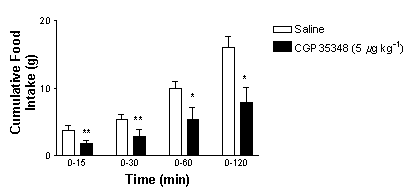| pA2
online © Copyright 2003 The British Pharmacological Society |
062P
University of Surrey Summer Meeting June 2003 |
|
Does endogenous GABA acting on general GABAB receptors play a tonic role in the control of food intake? S.M.
Patel & I.S. Ebenezer. Neuropharmacology Research Group, School
of Pharmacy and Biomedical Sciences, University of Portsmouth, Portsmouth,
PO1 2DT, U.K. |
Print abstract Search PubMed for: |
It has previously
been reported that intracerebroventricular (icv) administration of the
GABAB
receptor agonist baclofen increases food intake in rats and pigs by a
central mechanism of action (Ebenezer, 1990; Ebenezer et al., 1990).
However, it is not known whether endogenous GABA acting on central GABAB
receptors plays a physiological role in the regulation of food intake.
The present study was undertaken to investigate this possibility.
Experiment 1. Male Wistar rats (b. wt. 300 - 340g, n = 5) were chronically
implanted with icv cannula directed towards the lateral cerebral ventricle,
as described previously (Ebenezer, 1990). During experimental sessions,
the rats were food deprived for 22h and injected icv with either physiological
saline or 5 µg of the GABAB
agonist CGP35348 (Olpe et al., 1990). Immediately after injection,
the animals were placed singly in experimental cages with free access
to food and water, and food intake measured for 120 min. The animals received
both treatments in a cross-over design and 2 days separated successive
trials.
Experiment 2. Male Wistar rats (b. wt. 300 - 330g, n = 16) were divided
into two equal groups. The rats in Group 1 (Control Group) received daily
i.p. injections of saline for 58 days. The rats in Group 2 (Treatment
Group) were injected i.p. with baclofen (4 mg kg-1)
daily for 63 days. At the end of this period, the animals were food deprived
for 22h and both groups of rats injected i.p. with physiological saline
and placed in experimental cages with free access to food and water. Food
intake was measured for 60 min.
The results from Experiment 1 are shown in Fig. 1. ICV administration
of CGP35348 (5 µg) produced a significant decrease in food intake
during the 30 min measurement period. The data from Experiment 2 show
that the rats that were chronically treated with baclofen (Treament Group)
ate significantly less food than the rats chronically treated with saline
(mean cumulative food intake ± s.e. mean at 60 min: Control group
9.9 ± 0.6g, Treatment Group 8.3 ± 0.7 g, P<0.05).

Fig. 1. The effects
of icv administration of GCP35348 (5 mg).on food intake in 22h fasted
rats. Vertical lines rep. s.e. mean. *P<0.05, **P<0.01
(paired t-test).
The results obtained in Experiment 1 show that blocking central GABAB
receptors decreases food intake and suggest that endogenous GABA acting
at central GABAB
receptors has a tonic role in the control of food intake. This view is
further reinforced by the findings in Experiment 2. Evidence in the literature
indicates that chronic administration of baclofen down regulates central
GABAB
receptors (Malcangio et al., 1995). The observations that rats
chronically, but not acutely (unpublished data), treated with baclofen
display a reduction in food intake, suggest that this may be due to a
down regulation of central GABAB
receptors which, may in turn, decrease the effects that endogenous GABA
plays in regulating food intake.
Ebenezer, I.S. (1990) NeuroReport, 1, 73 - 76.
Ebenezer, I.S. et al. (1990) Br. J. Pharmacol., 101,
559-562.
Malcangio et al. (1995) NeuroReport, 6, 399 - 403.
Olpe et al. (1990) Eur. J. Pharmacol., 187, 27 -
38.